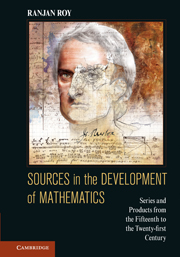 Sources in the Development of Mathematics
Sources in the Development of Mathematics Book contents
- Frontmatter
- Contents
- Preface
- 1 Power Series in Fifteenth-Century Kerala
- 2 Sums of Powers of Integers
- 3 Infinite Product of Wallis
- 4 The Binomial Theorem
- 5 The Rectification of Curves
- 6 Inequalities
- 7 Geometric Calculus
- 8 The Calculus of Newton and Leibniz
- 9 De Analysi per Aequationes Infinitas
- 10 Finite Differences: Interpolation and Quadrature
- 11 Series Transformation by Finite Differences
- 12 The Taylor Series
- 13 Integration of Rational Functions
- 14 Difference Equations
- 15 Differential Equations
- 16 Series and Products for Elementary Functions
- 17 Solution of Equations by Radicals
- 18 Symmetric Functions
- 19 Calculus of Several Variables
- 20 Algebraic Analysis: The Calculus of Operations
- 21 Fourier Series
- 22 Trigonometric Series after 1830
- 23 The Gamma Function
- 24 The Asymptotic Series for ln Γ(x)
- 25 The Euler–Maclaurin Summation Formula
- 26 L-Series
- 27 The Hypergeometric Series
- 28 Orthogonal Polynomials
- 29 q-Series
- 30 Partitions
- 31 q-Series and q-Orthogonal Polynomials
- 32 Primes in Arithmetic Progressions
- 33 Distribution of Primes: Early Results
- 34 Invariant Theory: Cayley and Sylvester
- 35 Summability
- 36 Elliptic Functions: Eighteenth Century
- 37 Elliptic Functions: Nineteenth Century
- 38 Irrational and Transcendental Numbers
- 39 Value Distribution Theory
- 40 Univalent Functions
- 41 Finite Fields
- References
- Index
20 - Algebraic Analysis: The Calculus of Operations
Published online by Cambridge University Press: 05 June 2012
- Frontmatter
- Contents
- Preface
- 1 Power Series in Fifteenth-Century Kerala
- 2 Sums of Powers of Integers
- 3 Infinite Product of Wallis
- 4 The Binomial Theorem
- 5 The Rectification of Curves
- 6 Inequalities
- 7 Geometric Calculus
- 8 The Calculus of Newton and Leibniz
- 9 De Analysi per Aequationes Infinitas
- 10 Finite Differences: Interpolation and Quadrature
- 11 Series Transformation by Finite Differences
- 12 The Taylor Series
- 13 Integration of Rational Functions
- 14 Difference Equations
- 15 Differential Equations
- 16 Series and Products for Elementary Functions
- 17 Solution of Equations by Radicals
- 18 Symmetric Functions
- 19 Calculus of Several Variables
- 20 Algebraic Analysis: The Calculus of Operations
- 21 Fourier Series
- 22 Trigonometric Series after 1830
- 23 The Gamma Function
- 24 The Asymptotic Series for ln Γ(x)
- 25 The Euler–Maclaurin Summation Formula
- 26 L-Series
- 27 The Hypergeometric Series
- 28 Orthogonal Polynomials
- 29 q-Series
- 30 Partitions
- 31 q-Series and q-Orthogonal Polynomials
- 32 Primes in Arithmetic Progressions
- 33 Distribution of Primes: Early Results
- 34 Invariant Theory: Cayley and Sylvester
- 35 Summability
- 36 Elliptic Functions: Eighteenth Century
- 37 Elliptic Functions: Nineteenth Century
- 38 Irrational and Transcendental Numbers
- 39 Value Distribution Theory
- 40 Univalent Functions
- 41 Finite Fields
- References
- Index
Summary
Preliminary Remarks
The operator or operational calculus, the method of treating differential operators as algebraic objects, was once thought to have originated with the English physicist and electrical engineer Oliver Heaviside (1850–1925). Indeed, Heaviside revived and brilliantly applied this method to problems in mathematical physics. But the basic ideas can actually be traced back to Leibniz and Lagrange who must be given credit as the founders of the operational method. With his notation for the differential and integral, Leibniz was able to regard some results on derivatives and integrals as analogs of algebraic results. The later insight of Lagrange was to extend this analogy to infinite series of differentials so that, in particular, he could write the Taylor expansion as an exponential function of a differential operator. In fact, this formal approach to infinite series appeared in the work of Newton himself. For Newton, infinite series in algebra served a purpose analogous to infinite decimals in arithmetic: They were necessary to carry out the algebraic operations to their completion. Newton's insightful algorithms using formal power series were of very wide applicability in analysis, algebra, and algebraic geometry; their power lay precisely in their formal nature. Thus, the algebraic analysis of the eighteenth century can trace its origins to Newton's genius. A branch of algebraic analysis focusing on the combinatorial aspects of power series was developed by the eighteenth-century German combinatorial school.
Information
- Type
- Chapter
- Information
- Sources in the Development of MathematicsSeries and Products from the Fifteenth to the Twenty-first Century, pp. 367 - 399Publisher: Cambridge University PressPrint publication year: 2011